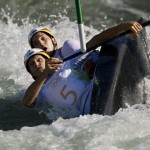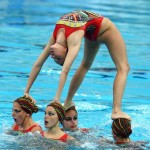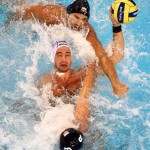Archive for the ‘Water Ressources’ tag
Local Water News – Extreme Events!
The Stuttgarter Zeitung recently published two articles related to water:
The first article describes the flood-protection measures for a part of the city of Tübingen. The city council just agreed to start building a dam in 2010. This dam will be able to stand in a flood with a 20-year return period.
A normally relatively small creek, the “Goldersbach“, has lead in the past after extreme precipitation events to extensive flooding and related destruction. The dam is part of a multiple-level protection strategy, which is outlined in this publication. The dam is a good thing, however it won’t withstand any substantial floods, that is floods bigger than with a 20-year return period. This is why the warning time is critical for the citizens living in the area! The article states that the warning time is five hours. It would be interesting to get to know details on how they estimate five hours as the warning time. Measurements have to be made, submitted, and calculations and predictions have to be made, involving fair amounts of uncertainty.
The second article describes how NASA researchers found out while working with GRACE data that groundwater levels are declining in India since 2002, even though the precipitation patterns have been fairly normal.
These are two practical examples that illustrate how extreme events are critical and need special attention!
Bill Gates Seems to be Into a New “Toy”
The “New Orleans Metro Real-Time News” (and they know) reports on a new toy of Mr. Microsoft, Bill Gates. He wants to deploy “tubs” into the ocean in hurricane-prone areas, such as off the coast of New Orleans. These tubs are supposed to “harvest” the energy of hurricanes, convert this energy into electrical energy via a turbine, and hence decrease the amount of destruction of a hurricane when it hits land. Call me a sceptic, but somehow it seems to me, those tubs might be destroyed before they can harvest any energy…
TV Show on Water
The Bavarian TV statation (BR) is showing every sunday night a “mini-serie” entitled “The Thirsty Planet” at 9:15pm. The first two sequels on agricultural water use and water in big cities have been broadcasted already. On sunday the topic will be engineering works related to water, followed by economic aspects of water and finally a show attempting an outlook on how the water-situation will develop.
Enjoy the show!
World Water Forum Istanbul
Currently, the 5th World Water Forum takes place in Istanbul. Its subtitle is “Bridging Divides for Water” hinting at the necessary turning point for water resources: making drinking water available for everybody. It seems like the geographic location of Istanbul might be a proper choice for that theme. There are six main themes, around which sessions are grouped: “Global Change and Risk Management”, “Advancing Human Development and the MDGs”, “Managing and Protecting Water Resources”, “Governance & Management”, “Finance”, and “Education, Knowledge and Capacity Development”.
Additionally, there is a big exposition with booths from participating countries and companies. There are “high level panels” on “water and disasters”, on “local financing”, on “water, food, and energy”, on “sanitation”, and on “water and climate change”.
The main webpage is huge, and it is a little hard to find out what is happening where. It seems like a huge congress though. It will be interesting to see what the outcomes are! The Guardian reports on the congress and on protesters. The article quotes Maude Barlow, recipient of the 2005 Right Livelihood Award and chairperson of The Council of Canadians:
It’s organised to look like a UN-type event but it’s not. […] It’s really just a big trade show put on by the big water companies. There is going to be no mention of water as a human right. They don’t want to support that because they see water as a commodity to be sold on the open market. There is mounting evidence that privatisation has failed. We believe water should be a public trust.
Maude Barlow is also member of the organizing committe of the “Alternative Water Forum“, which also takes currently place (March 20 to 22), also in Istanbul.
Geoengineering
Recently, I ran into the word geoengineering quite frequently. I kind of thought of it as a form of geotechnical engineering, but it seemed like the things that were talked about had not very much to do with geotechnical engineering.
This blog post will try and shed some light into what geoengineering implies. As [wikipedia][1] points out right at the start of its article on “geoengineering“, this term is not to be confused with “geotechnical engineering”! To keep confusion at a minimum level, let’s start with some definitions:
Definitions
To clarify things, here are a few related important definitions from wikipedia:
Geoengineering: manipulate the Earth’s climate to counteract the effects of global warming from greenhouse gas emissions.
Planetary engineering is the application of technology for the purpose of influencing the global properties of a planet. The goal of this theoretical task is usually to make other worlds habitable for life. Geoengineering ti the application of planetary engineering techniques to Earth.
Terraforming is a type of planetary engineering by which a planet’s surface conditions are altered to be more like those of Earth
Geotechnical Engineering is the branch of civil engineering concerned with the engineering behavior of earth materials
Geoengineering
One of the blog posts I came across recently which talk about geoengineering was a post by Miriam Goldstein at The Oyster’s Garter. She discusses the risks and benefits of geoengineering, especially a type of geoengineering called “iron fertilization”. This proposal involves “deliberately stimulating plant growth in the ocean with the aim that the excess material will be permanently sequestered in the deep sea. This would remove carbon from the atmosphere”. For German speaking readers, here is a nice summary. Other types of geoengineering she discusses include stratospheric aerosols, cloud whitening, atmospheric carbon capture, and geochemical carbon capture.
Probably, Miriam is talking about the same iron fertilization project as the german news-magazin “Der Spiegel” in its article from January 14th, 2009. “Der Spiegel” reported then that the project has been halted due to “environmental concerns” – the same concerns which have been raised by Miriram. On January 27th, the german federal research ministry allowed the Polarstern to conduct the experiment (see also this report). The AWI already posted first measurement results. I am not a remote sensing expert, but I kind of believe this map showing that more algae live in the area where the iron was put into the ocean. However, the total range of chlorophyll concentration on the map is from 0.1mg/m3 to 3mg/m3. That’s one order of magnitude. Map taken from here
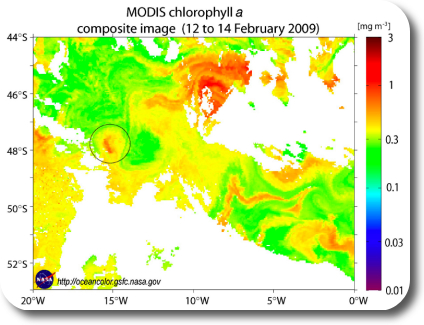
Map showing chlorophyll a concentration in the ocean at the are where iron was applied (circled) and in the vicinity of that area.
Another set of measurements made available by the Alfred Wegener Institute are depth profiles of dissolved oxygen, silicate, ammonium and chlorophyll taken at two different moments in time: before the iron was put in place and four days after. Again, I am not a biologist or oceanologist, but the changes do not seem extremely high. But then, it’s only after four days.

Concentration profiles of relevant aqueous concentrations before (red) and after (blue) the iron was brought out.
To conclude, I guess it’s too early to conclude if the experiment was successful or not. However, it seems a very risky and monetary intensive experiment.
Here are two more posts dealing with geoengineering:
James Hrynyshyn at “Living on an Island of Doubt in a climate of change” posts some similar doubtful concerns about the effectivity of geoengineering. He writes:
As Lenton and Vaughan write, geoengineering really only makes sense as a part of a larger strategy that includes cutting back hard on greenhouse gas emissions.
Wired reports on a “Carbon Burial” project, also referred to as “geological sequestration”, that will deposit a million metric tons of carbon dioxide into the ground by 2012. This is such a hot topic, it probably deserves an individual post.
After all these novel approaches, an interesting side-node from some classic geotechnical engineering, with an interesting outcome – Wired reports:
Drillers accidentally hit a pocket of molten rock underneath a working geothermal energy field in Hawaii, a lucky break for geologists that could allow them to map the geological plumbing that created everything we know as land.
update Wednesday; April 15, 2009: Wired has an article from a researcher on board a boat in the southern ocean.
No Blue — no Green
Sylvia Earle gave a great presentation on TED. Check out the website at TED for the movie of her presentation and additional information.
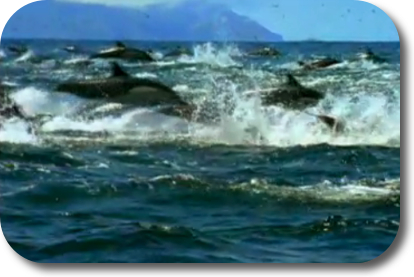
Dolphins -- scene from a movie showed during Sylvie Earle's presentation at TED.
Sylvia is a deep ocean exploration expert. Her talk is on the importance of the oceans to know everything about our live support system — Earth. She gives a very vivid and powerful presentation trying to motivate us that saving the oceans and marine life is critical. Right now.
She has worked on the team that incorporated the oceans into google earth.
Plup!
For already quite a while doughnut-shaped water bottles are available in Finnish supermarkets. The idea is, to donate 10 cents of each sold bottle for the protection of the Baltic Sea. Is this sensible? The bottle is a disposable one. The water is tap water. It isn’t even sparkling water, because most people don’t like bubbles in water (as long as there isn’t also hop and malt).
In most bars and restaurant in Finland you get tap water for free. There are no additional costs for transport and packaging and you can be sure the water is potable. As long as you don’t live in Nokia, there is absolutely no reason to buy bottled water. Drinking tap water and investing some money in a proper waste water treatment at the summer cottage is probably far more sensible than doughnut-shaped bottles.
Anyway, the advertisement video is nice. Participants are Bam Margera, HIM and Jorma Uotinen, which is a famous Finnish dancer.
Organizations That Help Provide Drinking-Water
I came across the site of charitywater, who put an enormous effort into their website to help and drill wells. If it’s your birthday, you can sign up there and let people give money to those guys.
As a hydrogeologist, I want to point you also to hydrogeologists without border, who work along similar lines, but are trained hydrogeologists. I guess already from their name and the similarity to the probably better known medicines sans frontiers / doctors without borders, you can easily derive what their goal is.
Update Wednesday; April 22, 2009: Drinking Water for Life is another option if you are looking into ways to support people who can’t afford drinking water.
Update Sunday; April 26, 2009: Please check also “charity:water” out
Gustav
I just found a few interesting links related to Gustav, the Tropical storm that is going to hit the US Gulf Coast:
- The Google Earth Blog has put together a huge collection of links in google earth;
- Wired has maps by a reinsurance company on “Storm Surge Risks” along the US Golf Coast; Wired also has an interesting piece what sort of rescue or help resources are in place if disaster should strike;
The Olympics are over. What remains?
The Olympics are over. They are still, despite the doping problems, an awesome sports events. I did not get the chance to watch much due to the time difference between China and Germany. But I do have one favorite moment: the team table-tennis semi-finals between Germany and Japan. Such a close game, and so brilliant sports. Pictures connect and I just found this blog by the gang of Newsweek photo-journalists, some exceptional photographers, who covered the Olympics for their magazine. Shown below are some images related to water from those guys blog.
One of these Newsweek photographers, Donald Miralle, writes about one such cool moment, the 100m mens’ final. He describes how such moments remain cool moments, but the main characters fade away very soon:
[…] Peter Reid Miller of Sports Illustrated posed the question to me tonight before the start of the finals, “Do you even remember who won the 100 in Athens?” I was there, I shot it, I remember taking an OK frame of it, but for the life of me I couldn’t remember who won [It was Justin Gatlin of the U.S.–ED]. And you know why, after tonight NOBODY CARES. The athlete, whether it’s one of the Jamaicans or the American, will be on the front cover of every newspaper and Website for the next 24 hours. You won’t see them again in the headlines for another four years. Unless, that is, one of them tests positive for doping…
Besides sports, the Olympic games put the focus on China. Here in Germany, every day there was some report on something in China. This is, I think, how this relates to planetwater: So many people live in China, and there are so many environment-related problems. Some problems were created specifically because of the Olympics — the water for the white water canal had to come from somewhere, whereas everything in this area usually is rather dry. So these are some environmental problems related to the Olympics I am aware of:
Environment
- water problems — this is only one example of many. And we will not talk about the Three Gorges Damn now.
- air quality problems do exist (see also here) in Peking, for the Olympics cars were taken from the road (Spiegel a and b), and factories were shut down
- there were health concerns before the start of the Olympics, I haven’t heard, seen, or read any about this after the start of the Olympics
- there were big problems with algae in the water where the sailing and rowing events took place. The algae were removed by manual labour. These problems did not seem to exist during the Olympics
For the course of the Olympics, it seemed like those problems were handled (maybe not exactly solved) fairly well. But what about now? Factories can not be shut down for ever. And I would guess that the cars will push onto the streets again fairly soon. And the eye of the international media will not be there anymore, not to the extent as during the Olympics anyways. The human rights issues that exist in China were not ignored in “Olympic TV coverage”, and human rights are the basis for any human being:
Human Rights
- two old women were sentenced to re-education camp after they tried to protest for not receiving sufficient compensation when their homes were seized for redevelopment. This story was picked up in Germany by the ZDF, and had prominent air time during two news broadcasts.
- before the start of the Olympics people were given the right to speak out their opinions if they apply to do so. After the start of the Olympics it became clear that nobody was granted that right
Some people claim there is a set-back regarding human rights in China due to the Olympics. Who will report, not to speak of control, when the majority of the media is gone and TV time-slots are back to normal and away from China? And what will happen with and in Tibet? Nobody has talked about all those protests when the Olympic fire was in San Francisco and other places. What will happen to the people that wanted to demonstrate during the Olympics? Let’s hope things don’t get worse after the Olympics than they were before. How should human beings care for the environment or clean up environmental pollution, if their individual rights are not existent? I found this picture that captures the point of authors cited in this post here. Along the same lines follows the quote below by Sharon Hom, Executive Director of HRIC.
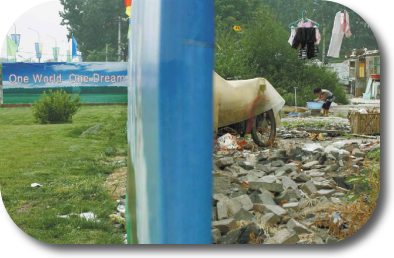
Every coin has two sides.
The carefully orchestrated facade could not conceal a police state that tramples on human rights.
